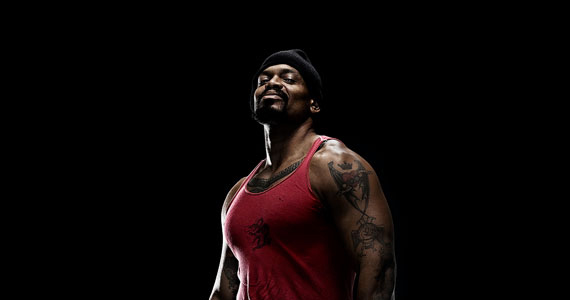Few names garner as much respect in Portland as Mic Crenshaw. Chances are, if you follow local hip-hop and/or community activism, you’ve heard his name. Thus, when KBOO announced the hiring of him and Monica Beemer as co-station managers, many around Portland were buzzing with excitement.
First and foremost, people were excited for Crenshaw as an individual. Beyond that, the hiring has implications for both the hip-hop and activism communities.
WOHM sat down with Crenshaw to discuss what it all means and what we can expect from KBOO in the near future.
“KBOO is a community resource,” he emphasizes.
Noting that it’s a non-commercial radio station, he says that listeners can expect to hear a lot of music they wouldn’t hear anywhere else. The news and public affairs programming has also gained notoriety for challenging the status quo.
However, Crenshaw puts special emphasis on the community aspect.
“News and public affairs programming and music aside, the fact that we’re a community radio station means anybody in the community can come down here and do the volunteer orientation and get training on the technical aspects of how this radio station works and with time, they can have a show if they want. Our airtime is pretty full but we’re talking about opening streams for online broadcasting that will enable us to have more content and less limitations on time, as far as scheduling people’s shows.”
Since the announcement of his hiring, Crenshaw says five or six people in the hip-hop community have reached out to him about putting on shows. He encourages anyone who is interested to get trained so they can take advantage of the move to streaming.
With the local scene as vibrant as it is, now is as good a time as ever. Crenshaw beams with pride when he talks about the wealth of talented artists Portland has to offer.
“I could go on and on talking on the town. To a certain extent, I don’t really look outside of Portland. There’s enough stuff reflected here that gives me—If I’m really gonna dig for what I need to see represented in hip-hop, it’s right here.”
Dating back to his move to Portland from Minneapolis in 1992, Crenshaw knows how valuable KBOO can be to up and coming artists.
Back then, he didn’t know many people and connected with local artists, including DJ Chill and Soul Rhythm Soldiers, who had a connection with the radio station. Crenshaw entered a couple of battles, winning one hands down and taking another in a disputed decision. These battles helped him gain respect as an MC.
Since, he’s appeared on the station numerous times to showcase his music and discuss community work. Crenshaw hopes to raise awareness of this resource so others can take advantage.
“I feel like we have at our disposal this resource that will allow people in the community that are part of hip-hop culture and identify with hip-hop and can relate to hip-hop to use KBOO as a means to program hip-hop content. The diversity of content available from different genres of hip-hop to peoples’ personal taste in music is something that can all be reflected without limitations that we would find at a commercial radio station. I’m hoping that just like when I was an up and coming artist in the city that I (an aspiring artist) can come down here and play my music and battle on the air. I’m hoping that we can bring back that aspect of community involvement with KBOO.”
The station has faced some issues in recent years, including a decline in listenership and last year’s well-publicized power struggle.
Since Crenshaw and Beemer were hired, Crenshaw notes there has been general feeling of excitement around the station. People want to move forward, he says.
Part of moving forward includes adapting to the changing landscapes of Portland and technology. More people are moving into the city and many potential listeners don’t listen to traditional radio anymore.
In response, KBOO is working on developing apps so people can access the station on mobile devices.
Crenshaw also wants to focus on outreach and membership. He hopes that his experience building relationships and community throughout Portland and as far out as South Africa, through projects like the Afrikan Hip-Hop Caravan, will translate to his efforts at KBOO. As co-station manager, he will be putting his efforts into development while Beemer concentrates on fundraising.
According to Crenshaw, KBOO raised $87,000 in two weeks in its most recent membership drive.
“What I’m looking forward to doing is taking something that works well and seeing how much better we can actually make it work. There are things we can all be critical of so lets take the things we might be critical of and improve on them.”
Bonus Info:
In addition to discussing KBOO, Mic Crenshaw also shared some of his thoughts on the local hip-hop scene’s issues with police and the OLCC.
“Hip-hop is under siege. I would dare to say that it’s not just in Portland but because the Black population is so small in Portland, it’s harder to have correct context in the popular discourse about what that term really means. When you say hip-hop is under siege, what you’re really talking about is Black culture. That can be misperceived. You say hip-hop and some people think commercial rap music. Commercial hip-hop is being used. It’s dumbing people down and keeping us focused on the values of the dominant culture.
“It’s this thing where hip-hop gets blamed for all these things that are actually aspects of dominant culture. If we go to the movies and watch this action movie, we can watch some action hero shoot up and kill hundreds of people in high speed chases, shootouts, explosions, this that and the other. But when young Black people talk about it in our music, we get blamed for society’s ills. When in actuality, it’s society itself that is the cause of all the problems, not young Black folks. I know for some of us, it’s just about the music and having fun, but when we leave the party and when we turn off the radio, we still have to deal with the reality of our condition. Hip-hop is a product of that to me.”


